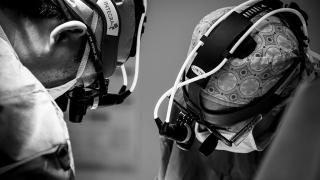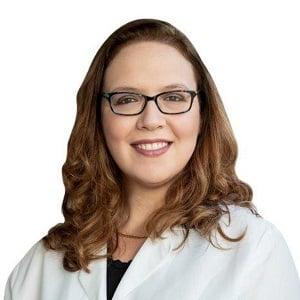Lorena Gonzalez, M.D., one of City of Hope’s newest breast cancer surgeons, has a unique way of reassuring fearful patients.
Basically, she points to herself.
“If they worry about losing their hair because of chemotherapy,” she explained, “I just grab my own hair and tug it. ‘See?’ I tell them, ‘Mine grew back!’ If they’re afraid surgery will disfigure them I ask them to take a good look at me. Do I look disfigured?”
Yes, she’s been through it all herself; the chemo, the surgery, the radiation and more, part of her life that helps her connect with patients on an intensely personal level.
“There’s something unique about Lorena,” said Laura Kruper, M.D., chief of the Division of Breast Surgery. “She’s very warm, caring, sensitive, empathetic and focused. We’re so grateful to have her join us and bring her experience with her. It opens our eyes a bit more.”
Talk about opening one’s eyes. Gonzalez’s personal battle with cancer did much more than simply enhance her bedside manner.
It’s the very reason she became a breast cancer surgeon.
It was not the original plan.
She knew she wanted to be a doctor ever since she was a little girl. In medical school she gravitated to vascular surgery for its meticulous planning and ultrafine techniques. She relished treating diabetics, heart disease patients and others, employing precision, lifesaving (and limb-saving!) surgical strategies.
Gonzalez spent five years building a reputation as an academic vascular surgeon in Syracuse, New York. She published papers and served on committees. She was 37, her star was rising, and she and husband Blas Ruiz planned to start a family. All was good.
Abruptly and unexpectedly, everything changed.
“I was in Texas to present at the Association of VA Surgeons Annual Meeting,” she recalled. The morning of her talk she remembers “rehearsing in my head. But then, in the shower, I felt a node in my armpit and a mass in my breast.”
She gave her talk and hurried home. It didn’t take long to find out the bad news: triple-negative breast cancer, Stage 2B.
“I was completely shocked, floored. My mind was racing,” she remembered. “Nothing like this had ever been on my radar.”
The shocks kept coming.
Genetic testing revealed that Gonzalez had inherited the BRCA1 mutation, putting her at dramatically high risk for breast cancer and ovarian cancer. The news both surprised and scared her.
“I had just a few distant relatives with cancer but they were much older,” she said.
Gonzalez couldn’t bear the thought of more cancer appearing. She decided to fight back aggressively, beginning right away with chemotherapy and a bilateral mastectomy (“Not even a question!” she insists) followed by removal of her ovaries by age 40 (as recommended in the guidelines of the National Comprehensive Cancer Network).
Gonzalez and her husband decided on one more thing. Before her treatment began, they “banked” some embryos. Just in case.
A change of heart
And this is when the hotshot vascular surgeon began thinking about a new direction.
She’d been so impressed with her cancer care at her local Syracuse facility, she naively thought, “This must be the standard for all women, everywhere … isn’t it?” Colleagues set her straight. There are too many gaps, they explained. Too many patients unable to receive mammograms or genetic tests, or benefit from state-of-the-art skills and technology.
That did it.
“Maybe,” she thought, “I can help fill that gap.”
It would mean, in effect, starting over. Setting aside her fast-track vascular surgeon life to become a student all over again, studying alongside recent med school grads a decade younger. Could she do it? Was it worth it?
She asked around. The answer that convinced her came from Patricia Newman, M.D., the first female president of the U.S. College of Surgeons.
“There’s still work to be done,” she told Gonzalez. “And you’re still young enough to make an impact.”
She dove in, applying everywhere for breast cancer fellowships. Most programs shied away, uncomfortable with her not-so-typical background.
City of Hope, however, called back. City of Hope specializes in the not-so-typical.
“We tend to pick candidates with a story,” said Kruper, adding that most applicants typically show up with stellar resumes; the trick is to seek people who stand out. Gonzalez impressed immediately.
“People go into breast cancer surgery for many reasons, some of them very personal,” said Veronica C. Jones, M.D., assistant clinical professor in the Division of Breast Surgery, explaining why Gonzalez was accepted. “Not many applicants are survivors, but I’ve known people whose illness changed their narrative.
“When we picked her, we knew.”
“Unanimously,” echoed Kruper, “we knew she was special.”
Getting in was one thing. Making the grade would be tougher. Learning new skills. Unlearning old ones (breast surgery and vascular surgery are very different; it’s far from a given that an expert in one can master the other. By all accounts, Gonzalez did superbly.) Not to mention the added stress of uprooting from the East Coast and moving to California. And remember those embryos? Before leaving Syracuse, Gonzalez underwent an IVF procedure. By the time she arrived in Duarte for the one-year fellowship, she was pregnant. She gave birth to a healthy baby boy in February 2020.
A survivor's perspective
On top of all that, that old fear came bubbling back up. As she began treating breast cancer patients, many in worse shape than she’d been, Gonzalez started to worry, “What if it happens to me again?”
All of it was overwhelming. Kruper and Jones calmed her, helped her pace herself, “talked me down from the ledge. Everyone was so kind to me,” recalled Gonzalez. She did so well, City of Hope hired her immediately.
Being a cancer patient gave Gonzalez a brand new career and a brand new view of the doctor-patient relationship, anchored by some absolutes.
“First,” she says, “always recognize the patient’s autonomy, how crucial it is. Their world has been turned upside down. They need to feel in control. Always involve them in the decision-making process. And remember that their quality of life matters!
“Second, realize that it’s not just the doctors but the support staff, too. The infusion nurses who took care of me had the patience of a saint! I’d never have known how important they are!”
Most important, she says, don’t allow patients to define themselves by their disease. Help them understand. The hair WILL grow back. Plastic surgery WILL make you whole again. You can get back to your normal life.
And if they’re afraid they’ll never have kids?
Well …
These days Gonzalez can just pull out a picture of her baby boy, born in February 2020.
“Here,” she might say. “Look at him!”

